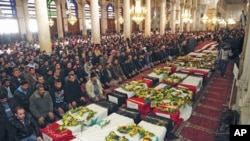The Syrian government organized an elaborate funeral Saturday for victims of the bombings that killed more than 40 people in a Damascus suburb. Government media blame al-Qaida for the blasts, but opposition figures claim the government itself was responsible for the attack.
Syria's minister for religious affairs, Mohammed Abdel Sattar Sayyed, read the Islamic prayer for the dead for all victims of two powerful explosions that erupted Friday near government security compounds.
Syrian state TV broadcast the funeral at Damascus' historic Omayyid mosque, with Christian, Muslim and Druze religious leaders taking part. Massed coffins of the victims were draped in Syrian flags. Many relatives wept openly; others kept a stoic silence.
Sunni Muslim cleric Mohammed Ramadan al-Bouti told the gathering those who perpetrated the crimes are “enemies of God and of mankind.” He blamed the Syrian opposition and its top leader, Burhan Ghalioun, for the bombings, and warned mourners either to support the government or face further strife.
Since the uprising began months ago, al-Bouti said he has told everyone repeatedly that the protests are heading in the wrong direction, and urged support for the government. The alternative, he said, is that more sectarian strife and bloodshed, like Friday's devastating bombings, would occur.
In the streets outside the Omayyid Mosque, what appeared to be a government-organized procession chanted slogans of support for President Bashar al Assad, and against the United States, the Arab League and Qatar's leader, Sheikh Hamad bin Jabber al Thani.
Activists and many opposition leaders outside Syria say they believe the government was responsible for the deadly bombings. Opposition leader Ghalioun contends that Assad's government is trying to mislead the world about what is happening inside Syria.
He said the regime is trying to deceive the Syrian public, the Arab League and its observers. He criticized the Arab League for failing to press harder for U.N. Security Council action against Syria, and said the league is responsible for the blood of the Syrian people.
The Security Council has been unable to reach a consensus on the situation in Syria. It has before it a draft proposal from Russia that does little to compel the Syrian government to end its brutal crackdown.
Khattar Abou Diab, who teaches political science at the University of Paris, said one should not draw rapid conclusions about Friday's bombings in Damascus, but that some of the government's claims are suspicious.
Abou Diab said it is a strange coincidence that the terror attack occurred just after the arrival in Syria of a team of Arab League observers. It also is odd, he said, that Lebanon's defense minister, a close ally of Syria, sounded a warning just before the bombings that al-Qaida fighters allegedly crossed secretly from Lebanon into Syria.
Abou Diab said everyone knows that border is closely watched. He noted that al-Qaida sent many militants from Syria into Iraq during the sectarian conflict there, so it is difficult to rule out the group's involvement in the Damascus attack. However, he stressed that Iran's ties to al-Qaida could suggest some sort of "manipulation” by parties aligned with the Syrian government.
| Join the conversation on our social journalism site - Middle East Voices. Follow our Middle East reports on Twitter and discuss them on our Facebook page. |




